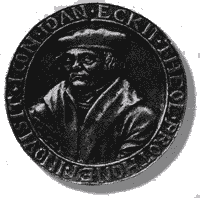|
Loading
|
|
|
The Holy Roman Empire
The Holy Roman Emperor
In the year 800, Charlemagne, king of the Franks, arranged for Pope Leo III to revive the title of Holy Roman Emperor and confer it upon him. The title had lain dormant since the fifth century. When the Carolingian line died out, the title fell once again into disuse, to be resurrected by successive dynasties of German kings, almost continuously from the mid-10th century until 1806.
The territory of the empire originally included what is now Germany, Austria, the Czech Republic, Switzerland, eastern France, the Low Countries and parts of northern and central Italy. Its sovereign was usually the German king, and the German lands were always its chief component.
Although the emperors were crowned by the Pope, from the 11th century onwards the empire and the papacy became embroiled in a long struggle for the leadership of Christian Europe.
The adoption of Protestantism by the German princes who supported Luther brought about the most severe rift between Church and Empire.
Within the time-frame of the play, two Holy Roman Emperors reign: Maximillian, to whom Pope Leo X appeals, and Charles V, who presides over the Diet of Worms.
The Diet of Worms
A Diet is a term used to describe a late medieval assembly of the Holy Roman Empire.
On 21 January 1521, Pope Leo X excommunicated Luther but Luther's Prince, Frederick of Saxony, refused to enforce the decree. Instead, Frederick used his influence with Charles V, the Holy Roman Emperor, to arrange for Luther to defend his writings at a Diet.
 The
Diet began on 17 April 1521 in Worms, Germany. Luther disputed his works with
the famous theologian and debator, Johannes von Eck. Eck asked Luther whether or
not he had written the books on display to the Diet. Luther asked for time to
consider Eck's question. On his return to the assembly, Luther confirmed that he
was the author of the books. When asked by Eck to recant the writings, Luther
refused, stating — famously — "Here I stand; I can do no other."
The
Diet began on 17 April 1521 in Worms, Germany. Luther disputed his works with
the famous theologian and debator, Johannes von Eck. Eck asked Luther whether or
not he had written the books on display to the Diet. Luther asked for time to
consider Eck's question. On his return to the assembly, Luther confirmed that he
was the author of the books. When asked by Eck to recant the writings, Luther
refused, stating — famously — "Here I stand; I can do no other."
The Diet's verdict branded Luther an outlaw and a heretic. Although it was never enforced by Duke Frederick III, the edict nevertheless restricted Luther's travel and left him totally dependent upon the Duke for protection.
Many regard Luther's unprecedented stand against the Diet and the Church to have been the catalyst for the subsequent Peasants' and Knights' Revolts.
Dr Michael Mullett is Senior Lecturer in History at the University of Lancaster. The most recent of his several books on religious history are Catholics in Britain and Ireland, 1559-1829 (Macmillan, 1998) and The Catholic Reformation (Routledge, 1999). He is currently preparing a new study of Martin Luther, again for Routledge.